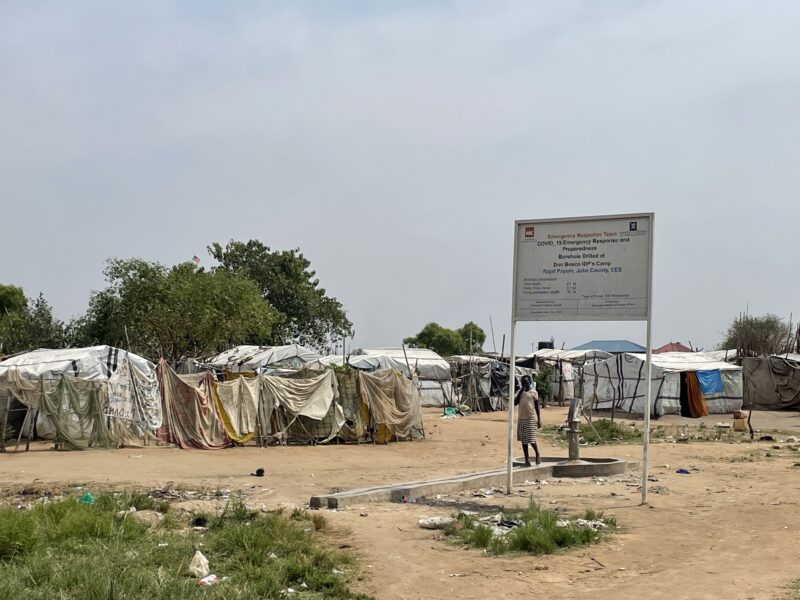In South Sudan, mobility and displacement have been part of people’s lived experiences for generations.
Displacement in and from South Sudan has been a common and sometimes repeated aspect of some people’s lives. Displacement patterns are entwined with conflict, complex household-level mobility strategies, as well as people’s misgivings and expectations about prospects for peace and political processes.
In January 2022, as part of the Displacement, Return and Reintegration in South Sudan study commissioned by the Research and Evidence Facility, the Samuel Hall team conducted lifeline interviews in Juba. The interviews shone a light on the lives of South Sudanese refugees who have returned to their country only to find themselves displaced again. Their lives have been interrupted by recurring displacement – caused by conflict and, most recently, flooding – in recent decades. Just one of many examples, the lifeline interview visually illustrated below shows one man’s continual cycle of displacement, due to volatile security conditions and personal challenges:

In December 2021, the research team completed a household survey with 750 participants in Juba, Malakal and Wau. Participants were drawn from internally displaced (IDP), returnee and hosting communities. However, it became clear from the outset that in the context of South Sudan, these categories may not always apply and there could be significant overlaps between them.
The household survey results emphasize the importance of social connections and family ties in informing mobility choices, influencing people’s well-being and improving their children’s chances for the future. This complex web of social relations stretches across long distances, connecting people living in South Sudan with members of their extended families who have sought refuge in neighbouring countries – specifically Kenya, Uganda and Ethiopia. Unable to return to their areas of origin, refugee returnees speak of the social connections Juba offers. The dispersion of family members across multiple sites can be both the result of a deliberate household strategy, and the consequence of insecurity and other barriers to mobility (including the high cost of transport).[1]

Yet, many women – often raising children on their own – do not have access to these social and family ties. They are more adversely affected by the losses caused by displacement. Interviews point to the influence of gender norms and customs on well-being, as well as women’s experiences of physical insecurity, even in a context such as Juba. Women research participants are often acutely aware of the risks they confront and the need to negotiate their lives – for example, in terms of forced evictions from IDP sites, camp closures, and the atrocities of conflict. But their capacities to cope with these stressors are limited, often leading to a feeling of despair. This is especially visible in interviews with women whose access to support networks and space for decision making are constrained by the narrow boundaries of patriarchal social norms and rampant gender-based violence. According to a returnee who moved back to Juba with her mother, after she separated from her father, ‘we had many relatives [In Juba] but no one wanted to have us with them […] I [now] live alone with my children. I don’t support my mother, it’s the other way around, she supports me.’
Many families in search of educational and livelihood opportunities have had to make the hard choice to split up, at least temporarily. This has both positive and negative impacts on childhood development, family relations and well-being. Aggregate survey data indicates that ‘split’ families are more likely to restrict food consumption – typically one of the most severe food coping strategies according to the Integrated Food Security Phase Classification (IPC). This is particularly relevant in 2022, which is set to be South Sudan’s “hungriest year,” where 80% of the population is already chronically poor. However, ‘split’ families are also more likely to receive humanitarian aid, including food aid, in designated camps. Families try to navigate an extremely precarious situation by relying on what little support they may get and splitting across borders and to different locations within South Sudan. Some study participants indicated that the worsening security situation following the conflict that erupted in South Sudan in 2013 (only two years after independence) had a catastrophic effect on their livelihoods and, consequently, their children. Research participants consistently indicated that they struggle to provide for their children and that only a few of them regularly attend school. This sometimes leads to difficult household choices. As one research participant whose family is in the Kakuma refugee camp (Kenya) put it, ‘it is very hard to be separated from the family; the reason I made those decisions is that here there are so many challenges. We could provide food for everyone but we would not be able to pay for school fees here.’
The insights provided here are preliminary and largely based on qualitative fieldwork in Juba.
Authors: Nassim Majidi, Giulio Morello and Devyani Nighoskar: Samuel Hall
[1] This is consistent with the findings of a recent study, according to which ‘the breadth, composition, and accessibility of a household’s social network influenced when, where, and under what conditions they eventually fled.’ Stites, E., Humphrey, A. (2020). The Currency of Connections: The role of social connectedness among South Sudanese refugees in West Nile, Uganda. Washington, DC: Mercy Corps.
